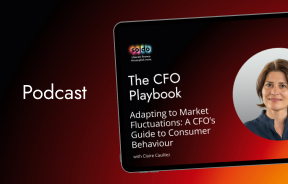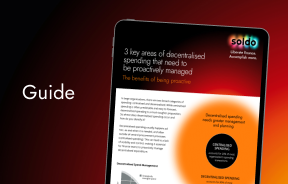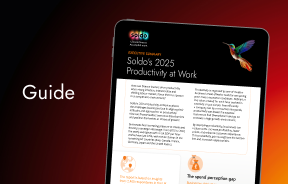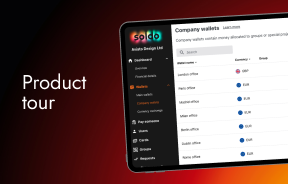08 Alpha Medical | With Kelly Battles, Acting CFO
Summary
After spending more than three decades in finance, Kelly Battles has come to appreciate that the budget isn’t the only balancing act CFOs have to master. The finance team needs to support the growth of the company, while also knowing when to implement limits.
Kelly learned that lesson in her first operational finance role, at internet security company IronPort. The business was growing rapidly, and Kelly’s overly cautious approach left the finance team racing to catch up.
Eventually, Kelly put her foot down to get the team what it needed to meet the surging demand. Under Kelly’s six-year watch, IronPort’s worth grew from $2 million to $250 million. The company was eventually bought by Cisco for $830 million in 2007.
Now acting CFO at Alpha Medical, Kelly’s main challenge as a finance leader is being both a support and a firewall for the business. She says that finance should find “the right balance between having the heart of a customer servant versus the mind of a police officer.”
To achieve that balance, it helps to understand every aspect of the business, so you can see where each department is coming from when they make seemingly unnecessary demands. The tools Kelly deploys to achieve that are data and human connections.
Data collection and utilization must be as simple, accessible, and connected as possible; this way, different parts of the business will be focused on the same information. As for the human element, Kelly says there are two levels of culture — culture with a “capital C” and culture with a “lowercase C” — both of which are crucial.
On this episode of The CFO Playbook, Kelly explains why creating a positive workplace culture is more important than many people think, how to be a cross-functional business partner and how to build a technology infrastructure that best serves the company.
Guest Analysis
Name: Kelly Battles
What she does: Kelly is currently acting CFO at Alpha Medical, and also sits on multiple boards and audit committees. Prior to this role, she served as CFO at Quora, Bracket Computing, and Host Analytics, and held other roles at Hewlett Packard, McKinsey and J.P. Morgan. She was VP of finance at IronPort when it was purchased by Cisco.
Key Quote: “Think of your infrastructure as a system, not a series of one-off solutions, and make sure that system works together.”
Where to find Kelly: LinkedIn
From Kelly’s Playbook
Good CFOs report the past and plan for the future.
Solid knowledge and implementation of finance rules and compliance will always be a vital trait of good finance leaders. But in the last few decades, the role has evolved from someone that simply reports the figures — the “stereotypical bean counter,” as Kelly says — to someone who understands how that data can be used to meet the business’s goals. Alongside that, CFOs are learning that saying “No” to big, growth-driving spending plans isn’t the safe option anymore, especially in the fast-moving startup world.
Create an infrastructure that gives you broad oversight.
When planning out which technology to invest in across all company departments, imagine a centralized network. Different departments need different tools, but they should all be able to speak to each other. Choose simple technology that does what you need it to and cuts out manual labor, but without a lot of overly complicated extra steps. This just-the-essentials approach cuts out bottlenecks and eases workflow.
A positive workplace culture attracts and retains the best people.
Competition for the most talented employees is intense. The best way to convince them to choose you and to stay is by promoting a positive workplace environment. Kelly differentiates between “capital-C Culture” and “lowercase-c culture”: the former describes your company’s mission and values while the latter refers to the everyday policies that serve as the foundation for capital-C Culture. That includes clear HR practices, strong leadership, transparent communication and fair compensation, as well as what Kelly calls “the fun stuff” — parties, events, etc. Kelly thinks that one of the factors that helped IronPort beat its competition and convince Cisco to buy it was because the company culture had attracted and retained highly talented engineers.
Finance must take responsibility for data.
As the department with often the most access to data, finance needs to take responsibility for the central management and advocacy of data within a company. When Kelly joins a new company, she asks each of the executives which metrics they care most about. The ones that come up across departments are the key corporate drivers, and the leftovers are the key functional metrics. It’s then a matter of tracking that data and making it readily available across departments, so it can be helpful for everyone.
Episode Highlights
How the 2008 crash changed the role of finance for good
“Two big drivers have — for better or worse — helped elevate the role of finance. One is the admin of SOX compliance. That really elevated the importance of getting accounting right, because companies that don’t get this stuff right end up getting restatements, which hurts your stock price. The second was the 2008 crash. It demonstrated the importance of using financial planning and analysis (FP&A) or the underlying data and analytics to navigate through tough times. Those two things have really helped evolve the role.”
Finance must deliver the data
“No matter how great the company, there are going to be strategic potholes. I’m a big believer that the way to get around those potholes is to bring data and information and associated recommendations to help executives, business leaders and team leaders make better decisions. And finance sits at the crosshairs of that, because we own a lot of the data and the information. It’s our job to help bring to bear the power of this data-driven decision-making to the company, to the executives and beyond.”
From counting beans to growing the business
“If you do it right, the role of finance or the CFO can evolve from what it was 25 years ago — just reporting business results — to actually helping drive better future results. So moving from the stereotypical bean counter, or the kind of reactive purveyor of rigid processes, to actually being a true strategic business partner: proactive and bringing to bear real-time information and analytics, flexible processes, etc.”
The balance between enabling and policing
“I’m a big believer in finding the right balance between having the heart of a customer servant versus the mind of a police officer. We are customer servants. We need to enable the business: we don’t need to slow it down. … But we also have to worry about the compliance part of the business. We need to keep people out of jail! We need to keep the trains running on time. It’s a spectrum, and either extreme is bad. You don’t want to be a pushover, but you also don’t want to be all about compliance.”
Choose the CFO that best fits your stage
“There’s this myth around, ‘We’re going public in a year, we need to bring in someone who’s done it three times before, or has been a banker and understands capital markets.’ You hire that person and then things don’t go as fast as you want — which they rarely do. … They get frustrated because the company’s not on track, and they leave. I’ve also seen companies outgrow the operational CFO, who can’t think through how to scale. … If you’re a CEO trying to find the right CFO, you need to consider: what’s the stage of the company? What’s the business model? What are the skills that person needs?”
Using your judgement on when to spend
“[Early on at IronPort] I underinvested in people and technology, because we were growing so fast and I was trying to be frugal. I would go to my boss and say, ‘I need this resource.’ He’d be like, ‘Can you make it work without this for another six months?’ I was a good soldier so I said yes. We still closed the books and we still got the work done, but we were too slow. We weren’t getting the information in the hands of the leaders fast enough. … It didn’t hurt the company, but catching up was very painful: it was like flying a jet and filling it with fuel at the same time.”
How to de-bottleneck any inefficiency
“You can de-bottleneck anything. Think about the setting, improving efficiency and workflows, setting up systems, etc. I treat it like a paper mill: lay out what you’re trying to accomplish, the process and the timing, and figure out where the bottlenecks are. You solve for those bottlenecks, you learn, you make sure it’s working, and lather, rinse, repeat.”
Why good company culture matters
“IronPort was able to hire great people. Google was getting really aggressive with hiring, and it was very hard to hire good engineers. But we were able to hire and retain great people who really loved the company and the mission. It’s very hard to describe good cultures. I think it’s very easy to describe bad cultures, but it’s very hard to describe why good companies with good cultures work, but this just organically worked and people loved being there. And it was a weapon.”
Top quotes:
“A good CEO typically lives in the future: they’re always looking at what’s around the corner. A bad CFO lives in the past: they’re focused on just closing the books. A good CFO can straddle that balance.”
“The key question is, what’s truly driving the business? And that changes over time, so you need to make sure it’s a dynamic question, not a static one.”
“The mantra should be: automate; single source of truth; link data. To me, those are the most important things.”
“In a finance team, the culture needs to be consistent with the company, but it doesn’t always have to be the same. Some of these things can vary depending on the needs of the team versus the needs of the company.”














